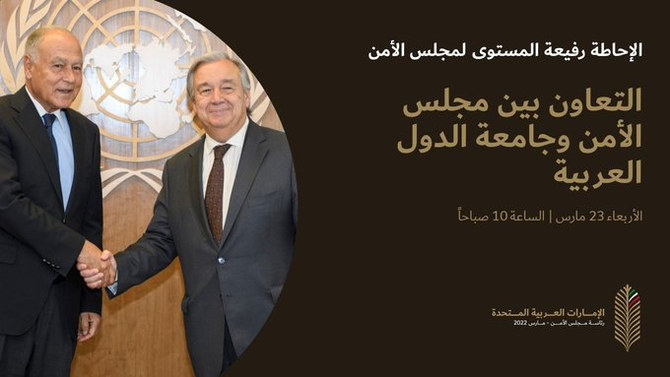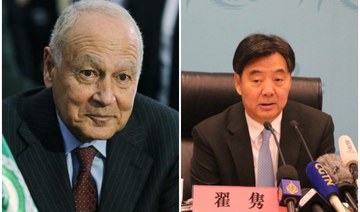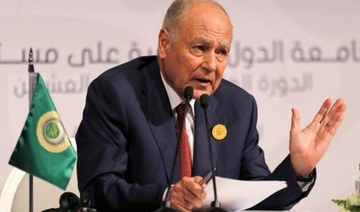NEW YORK: The UN and the Arab League remain united in their pursuit of multilateral solutions to “cascading” challenges facing the Arab world, UN Secretary-General Antonio Guterres said on Wednesday.
Stronger cooperation between the two organizations is essential for the enhancement of multilateralism, he added. He pointed out that the war in Ukraine and its profound ramifications around the globe have revealed the need for such cooperation to be all the more urgent, as many Arab countries, including Lebanon, Egypt, Libya, Somalia, Sudan and Yemen, import at least half of the wheat they require from Ukraine or Russia.
Since the war began on Feb. 24, food and fuel prices have soared as supplies were disrupted, which is “hitting the poorest the hardest and planting the seeds for political instability and unrest across the globe,” Guterres added.
He was speaking at a ministerial-level meeting of the UN Security Council. It was convened by the UAE, which holds the presidency of the council for the month of March, to discuss ways to improve partnerships and strengthen and institutionalize cooperation between the UN and the Arab League in areas such as conflict prevention, diplomacy, peacekeeping and peacebuilding, and to promote the role of women and youth in efforts to maintain regional and international peace and security.
The meeting was chaired by Khalifa Shaheen Almarar, minister of state at the UAE’s Ministry of Foreign Affairs and International Cooperation.
Guterres highlighted the existing aspects of cooperation between the UN and the Arab League relating to conflicts and crises in the Middle East. He welcomed the latter organization’s “constructive engagement” with efforts to safeguard the unity and “hard-won” stability of Libya since the ceasefire agreement of October 2020, and said he counts on it continuing to prioritize the need for an agreement on a comprehensive political process in the country.
Guterres also said that the two organizations remain firmly united in their support for the Syrian people, “who feel abandoned by the world as they enter the 11th year of a war that has subjected them to human rights violations on a massive and systematic scale and left the country in ruins.”
He reiterated that the only way to break the deadlock in Syria and alleviate the suffering of the people there lies in a “credible” political process that includes the implementation of Security Council resolutions.
Turning to the situation in Lebanon, Guterres said the UN is grateful for the work of the Arab League in urging authorities in the country to address the crisis there through a process that includes meaningful reforms, timely elections, constructive engagement with the International Monetary Fund and the full implementation of applicable Security Council resolutions.
He also welcomed the enhancement of strategic cooperation between members of the Iraqi government and the Arab League, including a mission to observe and monitor Iraq’s parliamentary elections in October last year.
A strengthening of regional cooperation is also critical in Yemen, Guterres said. Without efforts to agree a ceasefire, defuse tensions and advance an inclusive political process in the country, unceasing hostilities threaten to cause the already dire humanitarian situation to deteriorate further and dim the hopes of peace, he added.
The UN chief expressed disappointment at the results of a recent pledging event for Yemen, during which less than a third of the funds needed to address the humanitarian crisis in the country were received.
“I cannot overstate the severity of the suffering of the people of Yemen,” Guterres said. “I appeal to the generosity of members of the Arab League at this critical time.”
During the meeting the Security Council adopted a presidential statement, drafted by the UAE, welcoming the close cooperation between the UN and the Arab League and reiterating the intention to enhance their collaboration in a number of areas, including maritime safety and security, counterterrorism, respect for international law, poverty eradication, water security, and desertification and drought management in the Middle East and North Africa region.
The statement also affirmed the role of the youth population in efforts to maintain international peace and security, including the prevention and resolution of conflicts in MENA.
Ahmed Abul Gheit, the secretary-general of the Arab League, warned that the international order is again at a “most serious,” critical juncture as a result of the war in Ukraine.
“It is a deplorable situation,” he said and expressed hope that the international community can work to end the bloodshed, while honoring the security requirements of all those involved in line with the UN’s charter and principles.
However, he also said that he hopes the situation in Ukraine will not affect the ability of the Security Council to focus on other crises.
“The crises of the Arab world must not be forgotten,” Abul Gheit said. “These crises will not resolve themselves.”
The conflict in Ukraine provides a new prism through which to view the continuing suffering of the Palestinians, for example, he said as he stressed that the international order “cannot be based on double standards.”
Abul Gheit lamented the political impasse in Syria and the continuing repercussions for millions of Syrians. He also called for the withdrawal of foreign militias and fighters from Libya, saying that such interventions are complicating efforts to hold democratic elections in the North African country.
In Yemen, Abul Gheit said the Houthis refuse to engage with efforts to reach a political settlement and continue to threaten Saudi Arabia and the UAE with attacks using drones and ballistic missiles. He again welcomed the recent adoption of Security Council Resolution 2624, which extended sanctions against the Iran-backed Houthis and categorized them as “terrorists” for the first time.
He said Iran’s disruptive interventions in the region continue and its missile program is a “legitimate concern for the Arab League.” The organization seeks good relations with Iran, after Tehran ends its interference in regional and international affairs, but “this goal is still not within reach,” he added.
Emirati minister of state Almarar said Wednesday’s meeting was particularly important given that most of the issues on the Security Council agenda are Arab issues.
“As a result of the international community merely managing these crises rather than resolving them, several of these issues have been on the council’s agenda for decades,” Almarar said.
“The ongoing Israeli-Palestinian conflict and other crises in Syria, Yemen, Iraq, Libya, Lebanon, Sudan and Somalia have taken a high economic and humanitarian toll on the region.”
He said that these Arab crises, which have taken on cross-border and international dimensions, require efforts to address them on both the regional and international levels.
“The League of Arab States has a long history … extending back 77 years since it’s founding in 1945,” said Almarar. “It also possesses a deep knowledge of regional challenges, as well as the concerns of its member states, which enables it to play a leading role in supporting the implementation of the Security Council’s core mandate to maintain international peace and security.”
He called for enhanced cooperation between the UN and the Arab League, including the institutionalization of the relationship between them.


























